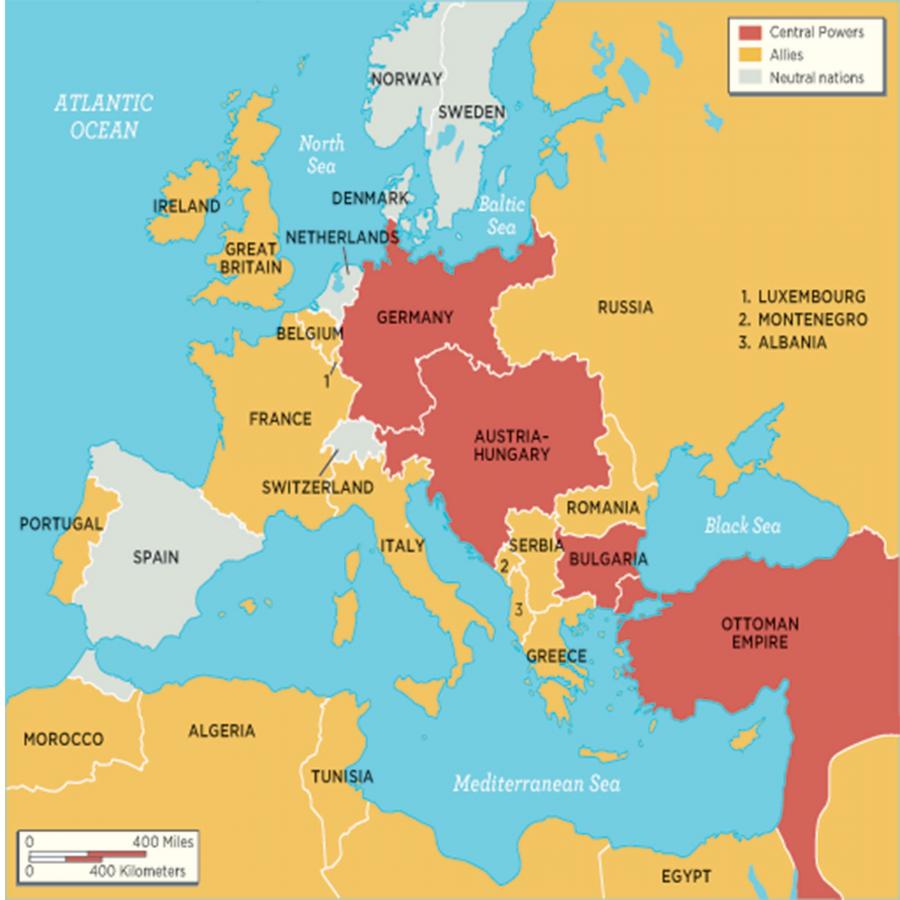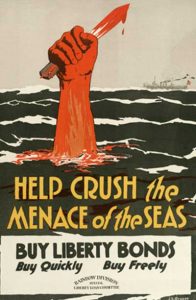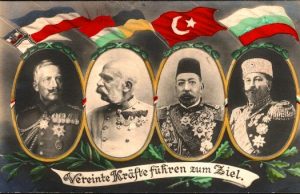The Central Powers were Germany, Austria-Hungary, the Ottoman Empire and Bulgaria. They were one of the two main Powers World War I. Although, they were defeated by the Allies. They originated with the alliance of Germany and Austria-Hungary in 1879. The Ottoman Empire and Bulgaria hadn’t joined until after the war had started in 1914. They were also supported by Azerbaijan and Finland, as well as Lithuania in 1918 and co-belligerent Jabal Shammar.
For around two and a half years, Woodrow Wilson tried to keep America neutral during World War I. Once America finally decided to join the war on the Allied side in 1917, Wilson had already allowed large-scale loans to Britain and France. However, Germany had offered a military alliance with Mexico in the Zimmerman Telegram. When America found out, it made them furious and gave them a national reason to fight. Fighting was also justifiedy when German U-boats started sinking American ships in the North Atlantic.
The name “Central Powers” came from the fact that all of the countries were in between Russia and France and the United Kingdom, which was known as Central Europe. The war was actually sparked by a move from the Serb nationalists against the Central Powers. The Black Hand gang assassinated Austria-Hungarian Archduke Franz Ferdinand in early July 1914. The Central Powers mobilized around 25 million soldiers. About 3.1 million were killed in action and another 8.4 were wounded.




Andrew Powers • Apr 7, 2015 at 12:12 pm
I’m presently surprised to find someone well read in the works of Karl Marx. admittedly I haven’t read The German Ideology (I now plan to) Ive only read his collaboration with Eangles, The communist manifesto. Too many people refuse to read Marx’s work due to his being a communist, but regardless of your economic/political views anyone who reads his work can find wisdom. Much like despite being a catholic im sure I would being a wiser fuller person after reading the Qur’an. But im neglecting the topic at hand.If you look you will find that the monarchs and political and military elite of Europe were all relatives or friends. There are unconfirmed stories of A Russian and a German general playing chess by mail while the soldiers under their command bled in the fields.
Andrew Powers • Mar 26, 2015 at 12:01 pm
Joining WW1 on the allied side was one of the worst thing the United states has ever done. Yes u-boats sank our ships but they only did so in areas where the German government had told everybody if you come here we will sink you, a testament to American stupidity and false neutrality we went to those places anyway. The British made a similar statement about sinking ships in the area around Germany northwestern coast and the American didn’t go into these areas. The British were our largest trade rivals and we also competed for naval supremacy so to ally with them would be and was a foolish decision. As to the Zimmerman telegram these sorts of deals were incredibly common everybody was asking everybody about forming an alliance against someone else. the reason we joined the Allied side was not for freedom or democracy or world peace or any of that nonsense no we joined purely out of capitalistic self interest. The rich people who owned the factories making helmets and artillery shells and whatnot had been selling huge amounts of these things(food was another big thing we sold them) to the Allies who mostly paid with credit. If we had joined the central powers the Allies would not have paid these rich people. the rich people knew this and thus used their vast wealth and influence to make sure we joined the Allies
oceanmtnsky • Mar 26, 2015 at 1:10 pm
This theory makes me think of Karl Marx who said, “The ideas of the ruling class are in every epoch the ruling ideas, i.e. the class which is the ruling material force of society, is at the same time its ruling intellectual force. The class which has the means of material production at its disposal, has control at the same time over the means of mental production, so that thereby, generally speaking, the ideas of those who lack the means of mental production are subject to it. The ruling ideas are nothing more than the ideal expression of the dominant material relationships, the dominant material relationships grasped as ideas.” (From “The German Ideology,” 1845)